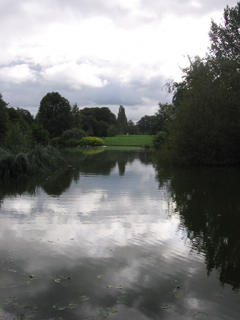Happy Birthday Jessica Berglund
One question I am pondering for the coming year: should I try to write my thesis and prepare for exams at the same time as I am writing the Graduate Record Exam (GRE) and submitting applications to doctoral programs? I will not have enough people to serve as references until I have finished at least one optional paper (at the end of November), and I have been very strongly cautioned not to use references from my undergraduate school. Apparently, this suggests to admission committees that you have failed utterly in your master’s program. Given how odd grading at Oxford is, this is definitely not a message that I want to transmit.
In many ways, it would be wiser to finish this year, then work somewhere for a year while completing my application to a PhD program. Of course, if my personal history shows anything, it is that I am much worse at getting jobs than at meeting any academic requirements. Case in point, last year I got into a master’s program at Oxford, but failed to become a barrista at Starbucks.
Long time readers, what do you think?


Take a year, get a job, pay down the debt, see the world beyond the ivory tower. If you’re still hooked at the end, accept one of the PhD offers you got in the interim.
Why are you so dead-set against the D.Phil again?
Another $21,773 in university fees, $4,623 in college fees, and about $14,000 in rent and $7,500 in food?
Compared to what I dearly hope would be a fully funded doctoral program at a very well funded American school.
I agree with you that it will require more effort to find an interesting job than to get into a doctoral program in the US. Your academic record is impeccable and the top American Universities like students with good schools in their past.
Your past jobs definitely do not reflect your potential or your interest. You have no exciting volunteer internships to help you. Getting a job requires using and taking advantage of any possible contacts and I do not think that you are as strong at doing that. Sooner or later you will have to venture into that world and if you want to take a break from academia, go for it. Travel, find an interesting job and live a real life for a while.
Even if you do a PhD, you’ll still have to face job-hunting (academic or non-academic) at the end of it…
Ben,
That is a good point, and it would pay to know at least a bit about non-academic options.
I will be on the lookout for interesting job possibilities for 07/08.
How much work would it be to apply to the D.Phil and take a third stab at getting some real funding? Maybe you will be third time lucky.
I’m firmly in the ‘get a job’ camp. I know you haven’t been very successful in the past, but you also haven’t applied for very interesting jobs either. As a related (and possibly unexpected) note, I know at least one person who has found their PhD to be a job getting impediment. Unless you are planning to become a professor, lots of people feel that having a PhD makes you too expensive, and maybe over qualified… just something to keep in mind.
R.K.
I don’t know, but I will ask my supervisor about it. As for funding, I don’t see much reason for which the Commonwealth, Chevening, Clarendon, and other big scholarships would see me much differently next year as they did this year. Not one of them even interviewed me.
Meghan,
What you say is true enough. I feel an intuitive aversion to most of the working world, largely because my forays into it have been so far from satisfying. If, as seems likely, I am going to make a living by writing and talking, having a PhD does seem likely to be an asset, rather than some kind of liability, especially if it is from a school of the type to which I am planning to apply.